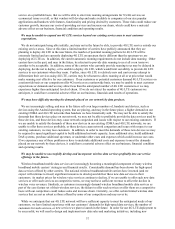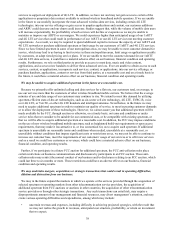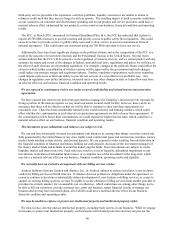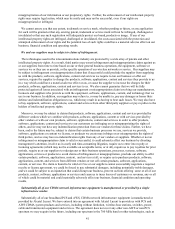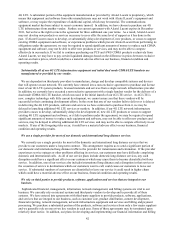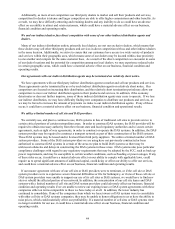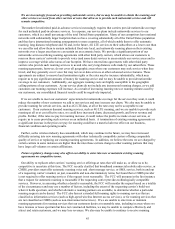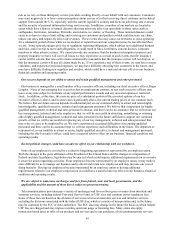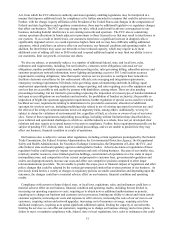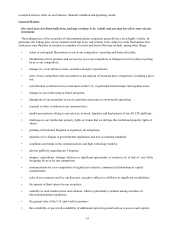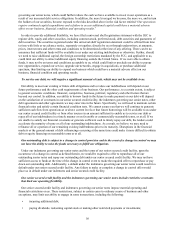Metro PCS 2010 Annual Report Download - page 56
Download and view the complete annual report
Please find page 56 of the 2010 Metro PCS annual report below. You can navigate through the pages in the report by either clicking on the pages listed below, or by using the keyword search tool below to find specific information within the annual report. 46
services in areas in which we hold licenses or lease spectrum after the expiration or termination of our existing
roaming agreements. We also may be obligated to allow customers of other technically compatible carriers to roam
automatically on our systems, which may enhance their ability to compete with us. If these risks occur, they may
have a material adverse effect on our business, financial condition and operating results.
Further, our roaming agreements and services may be with certain of our competitors and may create actual or
potential conflicts of interest, and may cause the parties to make decisions or take actions that do not reflect the
other’s best interests. None of these agreements restricts us from entering into similar arrangements with other
parties, but certain rights could be lost or agreements terminated if we enter into a similar relationship.
We may incur higher than anticipated intercarrier compensation costs.
When our customers use our service to call customers of other carriers, in certain circumstances we are required
under the current intercarrier compensation scheme to pay the carrier that serves the called party, and any
intermediary or transit carrier, for the use of their networks. However, as a wireless carrier we are not entitled to
receive access payments from interexchange carriers who route calls for termination on our network. A longstanding
FCC rulemaking proceeding is examining whether a unified intercarrier compensation regime should be established
for all traffic exchanged between all carriers, including CMRS carriers such as us. New intercarrier compensation
rules, if adopted, may result in increases in the charges we are required to pay other carriers for terminating calls or
transiting calls over their networks, increase the costs of, or make it more difficult to negotiate, new agreements with
carriers, and decrease the amount of revenue we receive for terminating calls from other carriers on our network.
New rules also may be subject to a transition period or policies that are not advantageous to wireless carriers.
We resell third party international interexchange services in connection with certain of our international
interexchange services. The charges for these services may be subject to change by the terminating or
interconnecting carrier, or by the regulatory body or agency having jurisdiction in the applicable foreign country. In
the event that the charges change, the terminating or interconnecting carrier may attempt to assess such charges
retroactively on us or our third party international interexchange carrier, which charges may be substantial, or we
may cease providing service to such foreign destination, which may cause prospective customers to not subscribe to
our service or current customers to terminate their service from us. If we are assessed additional charges on a
retroactive basis, the use of our services results in significant intercarrier costs, we are unable or unwilling to offer
services to certain foreign destinations, or prospective customers do not subscribe to our service or current
customers terminate service with us, it could limit our ability to grow our customer base which could have a material
adverse effect on our business, financial condition and operating results.
Some carriers who terminate calls originated by our customers have sought, and others may seek, to impose
termination charges on us that we consider to be unreasonably high and have threatened to pursue, or have initiated
or may initiate, claims against us to recover these charges. The outcome of these claims is uncertain. The FCC
issued a decision indicating that it intends to defer to state commissions to set the termination rates that wireless
carriers must pay to competitive local exchange carriers, or CLECs. We have appealed this decision, but the timing
and outcome of the appeal cannot be predicted with certainty. In the meantime, we already have been drawn into
multiple state commission proceedings in which CLECs are seeking approval of wireless termination rates that we
consider to be excessive. A determination that we are liable for additional or excessive terminating compensation
payments could subject us to additional claims by other carriers. Further, legal and business considerations may
inhibit our ability or willingness to block traffic to telecommunication carriers who demand unreasonable payments.
In addition, certain transit carriers have taken the position that they can charge “market” rates for transit services,
which rates may in some instances be significantly higher than our current rates or the rates we are willing to pay.
We may be obligated to pay these higher rates and/or purchase services from others, engage in direct connection, or
pay terminating compensation charges in the absence of negotiated agreements, which may result in higher costs,
which could have a material adverse effect on our business, financial condition, and operating results.
A portion of our third-party customer service and technical support providers and a portion of our revenue are
derived from geographic areas susceptible to natural and other disasters.
Our focus on major metropolitan areas and our use of third party suppliers and service providers, some of which
are located in developing nations, such as Mexico, Panama, Antigua and the Philippines, may make our products
and services more susceptible to certain events, including political upheavals, war, terrorist attacks, strikes, natural
disasters, and pandemics, which could adversely affect our business, financial condition and operating results. The
outsourcing of certain customer and technical support lowers our operating costs and adds flexibility, but also adds



